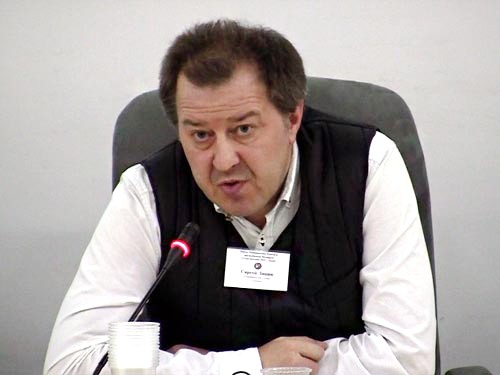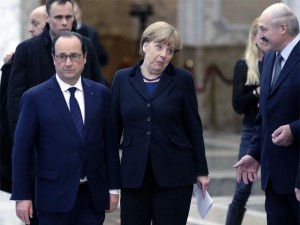Poland and Germany were both initiators and drivers of a New Eastern policy linked to the Eastern neighborhood and Russia/Soviet Union.
Serhiy Datsuk: NGO sector structures that are funded by business are no longer civil society!

Which processes indicate civil society? And why is it weird for a thirty-age man to devote himself to self-development, not family?
Ukrainian political expert Serhiy Datsuk shared his opinion on what is important to know and understand about the civil society in modern situation at Ukraine’s example. Serhiy Datsuk is a theoretician and expert from Foundation For Future project; he worked in the sphere of analyzing and expert examination of political decisions at the market of commercial consulting. The report of the scientist was presented within the frames of the scientific discussion on the change of a paradigm in the course of the 5th International Congress of Belarusan Studies in Kaunas.
“When we are talking about the possible forms of civil society’s existence, we are talking about substantialism. There is no civil society in reality; nothing to form, to develop, and to explore.
When someone says that civil society develops itself or, for example, it develops the state, it is fundamentally wrong. First of all, because something can only exist in its reality when it provides some conditions for something else apart from itself.
If you ask a teenager of 13-14 years what he or she does, and the teenager answers that he or she devotes time to self-development, it is ok. But it will be weird for a thirty-age man to answer in the same way, because in his age it’s about time to take responsibility for others — children, family, corporation, and the business he is in charge of.
In this sense the reality, where civil society exists, can be recorded by means of two processes. The first one is a public civic discourse; and second is civic practice — the realization of this public civic discourse, this community, and not some different one.
I see civil society as free association of citizens that take upon themselves responsibilities and manage the space where they exist. And judging from its basis, civil society is a much deeper enterprise than a republic is.
If a republic is a common cause, civil society resolves issues that were on the agenda before the republic: why should we live together, regardless of political constraint of the state and forced economic consumption of corporate products?
It is an important component that appears in the 21st century: civil society doesn’t depend on the state and on corporations. Civil society is a civic discussion at level of social networks in the Internet and clubs (structures with no membership fees, programs, and charters). But it also ends at this level, too.
After that come political parties that bring institutionalization; a republic finds itself at the same level. The parties that enter the parliament get an access to the government, which is already a state level together with lobbying of corporate interests.
Structures that are similar to NGO sector funded by foreign or domestic business are found at the level of a republic. They are not a part of civil society!
Civil society is represented by free associations that spend their own money. Roughly speaking, these are volunteers, who “invest” their money, free time, and labor. As soon as you face the fact of funding — no matter whether it is a political party or someone else, civil society ends.
What is a civic discourse? I view it in a constructive way. A civic discourse consists of five meaningful structures that I have singled out myself, creating a civic discourse. The first one is generalization: who are we in general. The second one is chronotopia: what is our common conceptual time and space? Third one is sacralization: How we all step out of routine? Fourth one is sensualization: what are our common senses? The fifth structure is prospectualization: what are our common prospects? And the sixth one is securitization: How and from what should we protect ourselves? There are the six basic structure of the common civic discourse’s content.
If there is no civic discourse there is no civil society. Any attempt to consider some institutions and people who live off grants to be this civil society have no sense. If there are above-mentioned meaningful items, there is no civil society.
Next thing is civic practice. Sometimes one might see civil society together — this is, for example, Maidan. It gathers together and represents a really powerful force. But it happens rarely. In this sense revolutionary practice is a practice of the civil society that is getting ready. Roughly speaking, revolutions are prepared long before they start.
What were the components of the Ukrainian revolution? There were several of them. First, geopolitical: a change of Ukraine’s geopolitical orientation, the so-called “EuroMaidan”. Secondly, national revolution: active demonstration of how works the national self-conscience that cuts itself off self-consciences of other nationalities. Anti-colonial revolution: an attempt of political and economic and cultural emancipation from Russia.
Next factor is a civil revolution: emergence of an active civil society — mass volunteer movement that takes upon itself functions of the state and even the army. I.e. for many months Ukraine didn’t have its own army; that’s why volunteers were fighting; it happens. Within the frame of this component a gradual replacement of national and ethnical content happens.
One more thing is structural revolution, where social networks have significant influence on reality. Apart from that, a revolution of thinking and anthological images about the world and a revolution of visions of the human world’s prospects.
What didn’t happen? A constitutional revolution, an administrative revolution, a scientific revolution, a technological revolution, and artistic revolution didn’t happen. It was different it times of the Bolshevik revolution. It might be that we just haven’t yet experienced that in Ukraine.
Let me sum up everything I’ve said. Civil society is a society of free individuals, where public civic discourse exists. Civil society — the one that is busy with practice, but isn’t practice itself — is the practice in transformation of the republic, reestablishment of the state and corporations. Let me note that earlier civil society has never aspired to reestablish corporations; while Ukrainian revolution put this question.
In fact, discourse and practice are the things that civil society should be involved in.”
Video of the discussion (in Russian and English):
Others
-
Uladzimir Matskevich: The sooner the "Union State" is denounced, the better for Belarus
Not only does the “Union State” undermine the establishment of civilized relations with Europe, but it hinders the possibility of normal relations between Belarus and Russia.
-
Uladzimir Matskevich: The regime can no longer control the situation in the country
The authorities are unable to prolong the social contract with the people: there is no way out of the social crisis.
-
Press release of the BNP in connection with the next round of the dialogue in the format of the EU-Belarus Coordination Group
Belarusan National Platform of the Eastern Partnership Civil Society Forum welcomes the dialogue process in the format of the EU-Belarus Coordination Group, the third round of which was held in Minsk on 3-4 April 2017.
-
Hennadiy Maksak: Europe must react adequately to the events in Minsk
A new wave of political repressions should make the EU return to tougher policy towards the Belarusan regime.








Comments
From farewell to a new Eastern policy and towards a new development
Poland and Germany were both initiators and drivers of a New Eastern policy linked to the Eastern neighborhood and Russia/Soviet Union.